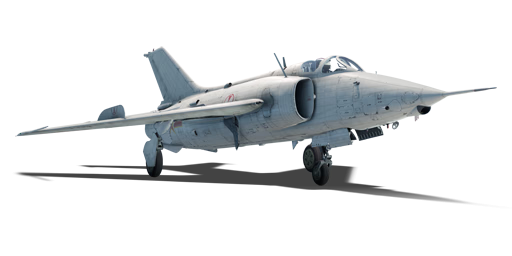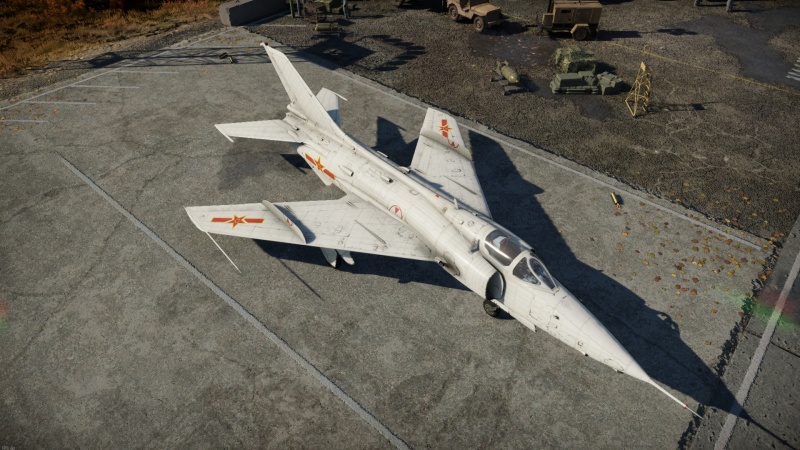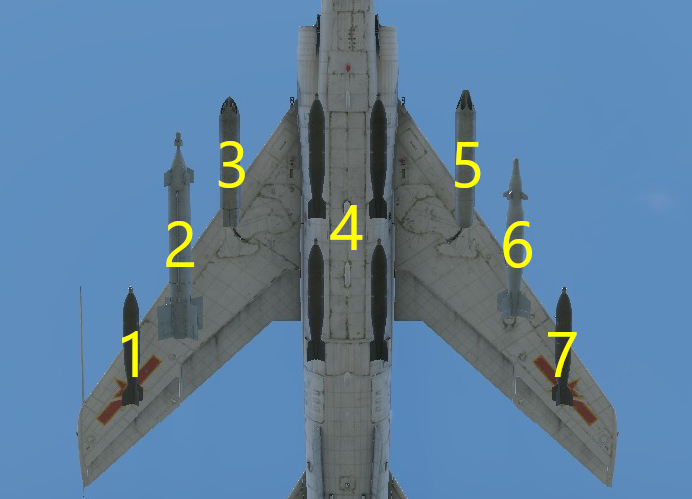Difference between revisions of "Q-5L"
(→Suspended armament: Updated) |
m (→Survivability and armour: its not 60mm bulletproof glass but 4.5 + 8mm, two layer, bulletproof glass.) (Tag: Visual edit) |
||
| Line 110: | Line 110: | ||
* 10 mm steel plate behind nose cone | * 10 mm steel plate behind nose cone | ||
| − | * | + | * 4.5 + 8 mm bulletproof glass in front of the cockpit |
* 8 mm steel plate underneath cockpit | * 8 mm steel plate underneath cockpit | ||
* 25 mm steel armoured pilot's seat | * 25 mm steel armoured pilot's seat | ||
Revision as of 23:59, 11 November 2022
Contents
Description
The Q-5L (NATO: Fantan) is a rank VII Chinese strike aircraft with a battle rating of 11.0 (AB), 9.7 (RB), and 10.7 (SB). It was introduced in Update "Fire and Ice".
One of the latest revisions of the Q-5 series in PLAAF , the Q-5L will prove deadly to ground targets with its sufficient payload and updates to its avionics and new sensors for ground attacks, as well as new precision bombs.
General info
Flight performance
For players who have flown the Q-5 series, Q-5L still retains the same flight performance - although sharing many parts with the J-6A, due to the lack of weight-reduction measures, Q-5s are in fact structurally overweight; while it has better sustained turn to heavier jets such as Phantoms thanks to its engines, do note that the weight issue still haunts the jet. Beware of any targets that have higher manoeuvrability, although your higher speed might save you from subsonic jets, any supersonic jets will have no problem chasing a Q-5L. Another note is that the Q-5L still retains the same control surface lock-up at transonic speeds (>850 km/h and before hitting Mach 1.0), use the airbrakes according to the situation for both regaining control or "snap-shots" on enemy targets.
| Characteristics | Max speed (km/h at _,___ m) |
Max altitude (metres) |
Turn time (seconds) |
Rate of climb (metres/second) |
Take-off run (metres) | |||
|---|---|---|---|---|---|---|---|---|
| AB | RB | AB | RB | AB | RB | |||
| Stock | ___ | ___ | 16500 | __._ | __._ | __._ | __._ | 850 |
| Upgraded | ___ | ___ | __._ | __._ | __._ | __._ | ||
Details
| Features | |||||
|---|---|---|---|---|---|
| Combat flaps | Take-off flaps | Landing flaps | Air brakes | Arrestor gear | Drogue chute |
| _ | _ | _ | _ | _ | _ |
| Limits | ||||||
|---|---|---|---|---|---|---|
| Wings (km/h) | Gear (km/h) | Flaps (km/h) | Max Static G | |||
| Combat | Take-off | Landing | + | - | ||
| 0 | 577 | ___ | ___ | ___ | ~__ | ~__ |
| Optimal velocities (km/h) | |||
|---|---|---|---|
| Ailerons | Rudder | Elevators | Radiator |
| < ___ | < ___ | < ___ | N/A |
Engine performance
| Engine | Aircraft mass | |||||
|---|---|---|---|---|---|---|
| Engine name | Number | Basic mass | Wing loading (full fuel) | |||
| _____ | _ | _,___ kg | ___ kg/m2 | |||
| Engine characteristics | Mass with fuel (no weapons load) | Max Gross Weight | ||||
| Weight (each) | Type | _m fuel | __m fuel | __m fuel | ||
| ___ kg | ___ | _,___ kg | _,___ kg | _,___ kg | _,___ kg | |
| Maximum engine thrust @ 0 m (RB/SB) | Thrust to weight ratio @ 0 m (___%/WEP) | |||||
| Condition | 100% | ___%/WEP | _m fuel | __m fuel | __m fuel | MGW |
| Stationary | ___ kgf | ___ kgf | _.__ | _.__ | _.__ | _.__ |
| Optimal | ___ kgf (_ km/h) |
___ kgf (_ km/h) |
_.__ | _.__ | _.__ | _.__ |
Survivability and armour
- 10 mm steel plate behind nose cone
- 4.5 + 8 mm bulletproof glass in front of the cockpit
- 8 mm steel plate underneath cockpit
- 25 mm steel armoured pilot's seat
- 10 + 16 mm steel armoured pilot's headrest
- Self-sealing fuel tanks behind cockpit and underneath engines in rear fuselage
The Q-5L shares the same protection as its predecessors. Due to the need for ground attack and some protection for the pilot, the cockpit is enclosed by steel plates and comes with bulletproof glass. While this might not be sufficient against any autocannons at the rank, it could at least make sure the pilot will not be knocked out right away by incoming shots or shrapnel. The engines are still unprotected, but the installation of fire suppression systems allows the Q-5L to have greater odds to survive a fire onboard.
Modifications and economy
Armaments
| Ballistic Computer | |||
|---|---|---|---|
| CCIP (Guns) | CCIP (Rockets) | CCIP (Bombs) | CCRP (Bombs) |
| |
|
|
|
Offensive armament
The Q-5L is armed with:
- 2 x 23 mm Type 23-2K cannons, wing-mounted (120 rpg = 240 total)
Suspended armament
The Q-5L can be outfitted with the following ordnance presets:
- Without load
- 28 x Type 90-1 rockets
- 16 x Type 130-2 rockets
- 2 x 260 kg TS250 bombs (520 kg total)
- 2 x 570 kg LS-500J bombs (1,140 kg total)
- 8 x 250 kg 250-3 bombs (2,000 kg total)
- 2 x 500 kg 500-3 bombs (1,000 kg total)
Custom loadout options
| 1 | 2 | 3 | 4 | 5 | 6 | 7 | ||
|---|---|---|---|---|---|---|---|---|
| 250 kg 250-3 bombs | 1 | 1 | 4 | 1 | 1 | |||
| 500 kg 500-3 bombs | 1 | 1 | ||||||
| 260 kg TS250 bombs | 1* | 1* | ||||||
| 570 kg LS-500J bombs | 1* | 1* | ||||||
| Type 90-1 rockets | 7 | 7 | 7 | 7 | ||||
| Type 130-2 rockets | 4 | 4 | 4 | 4 | ||||
| K/PSZ-01 | 1* | |||||||
| * The K/PSZ-01 targeting pod must be carried when equipping laser guided bombs | ||||||||
Usage in battles
Describe the tactics of playing in the aircraft, the features of using aircraft in a team and advice on tactics. Refrain from creating a "guide" - do not impose a single point of view, but instead, give the reader food for thought. Examine the most dangerous enemies and give recommendations on fighting them. If necessary, note the specifics of the game in different modes (AB, RB, SB).
Pros and cons
Pros:
- New HUD with ballistic computer
- Built-in TVD camera for target acquisition; alternatively equipped with an advanced targeting pod
- Access to 250/500 kg guided bombs
- Sufficient manoeuvrability at around 700 km/h
- Great acceleration thanks to the WP-6-IIIA engines
- Access to RWR
Cons:
- Same bulky airframe as all its predecessors and still locks up at transonic speeds
- The built-in camera only has 1.5x magnification
- Lacks any type of AAM and countermeasures, unlike its technological predecessor A-5C
- Type 23-2K cannons needs extra practice against aerial targets
- Subpar payload to its NATO/Warsaw Pact counterparts
History
Describe the history of the creation and combat usage of the aircraft in more detail than in the introduction. If the historical reference turns out to be too long, take it to a separate article, taking a link to the article about the vehicle and adding a block "/History" (example: https://wiki.warthunder.com/(Vehicle-name)/History) and add a link to it here using the main template. Be sure to reference text and sources by using <ref></ref>, as well as adding them at the end of the article with <references />. This section may also include the vehicle's dev blog entry (if applicable) and the in-game encyclopedia description (under === In-game description ===, also if applicable).
Media
Excellent additions to the article would be video guides, screenshots from the game, and photos.
See also
Links to the articles on the War Thunder Wiki that you think will be useful for the reader, for example:
- reference to the series of the aircraft;
- links to approximate analogues of other nations and research trees.
External links
Paste links to sources and external resources, such as:
- topic on the official game forum;
- other literature.
| China jet aircraft | |
|---|---|
| Fighters | J-2 · J-4 · J-6A · J-7II · J-7D · J-7E · J-8B · J-8F · J-10A · J-11 · J-11A |
| Strike aircraft | Q-5 early · Q-5A · Q-5L · JH-7A |
| Bombers | H-5 |
| France | ␗Mirage 2000-5Ei |
| USA | ␗F-84G-21-RE · ␗F-84G-31-RE · ␗F-86F-30 · ␗F-86F-40 · ␗F-100A · ␗F-100F · ␗F-104A · ␗F-104G · ␗F-5A · ␗F-5E · ␗F-16A MLU |
| USSR | ␗MiG-9 · ␗MiG-9 (l) |
| North Korea | Shenyang F-5 |
| Pakistan | A-5C · JF-17 |






